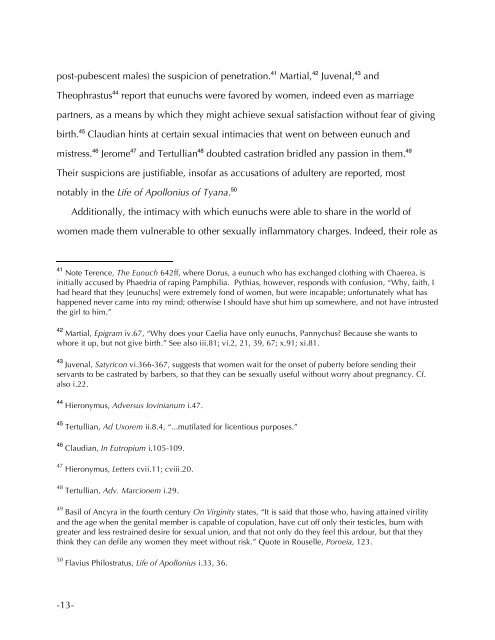-1- Eunuchs and the Postgender Jesus: Matthew 19:12 and ...
-1- Eunuchs and the Postgender Jesus: Matthew 19:12 and ...
-1- Eunuchs and the Postgender Jesus: Matthew 19:12 and ...
Create successful ePaper yourself
Turn your PDF publications into a flip-book with our unique Google optimized e-Paper software.
post-pubescent males) <strong>the</strong> suspicion of penetration. 41 Martial, 42 Juvenal, 43 <strong>and</strong><br />
Theophrastus 44 report that eunuchs were favored by women, indeed even as marriage<br />
partners, as a means by which <strong>the</strong>y might achieve sexual satisfaction without fear of giving<br />
birth. 45 Claudian hints at certain sexual intimacies that went on between eunuch <strong>and</strong><br />
mistress. 46 Jerome 47 <strong>and</strong> Tertullian 48 doubted castration bridled any passion in <strong>the</strong>m. 49<br />
Their suspicions are justifiable, insofar as accusations of adultery are reported, most<br />
notably in <strong>the</strong> Life of Apollonius of Tyana. 50<br />
-13-<br />
Additionally, <strong>the</strong> intimacy with which eunuchs were able to share in <strong>the</strong> world of<br />
women made <strong>the</strong>m vulnerable to o<strong>the</strong>r sexually inflammatory charges. Indeed, <strong>the</strong>ir role as<br />
41 Note Terence, The Eunuch 642ff, where Dorus, a eunuch who has exchanged clothing with Chaerea, is<br />
initially accused by Phaedria of raping Pamphilia. Pythias, however, responds with confusion, “Why, faith, I<br />
had heard that <strong>the</strong>y [eunuchs] were extremely fond of women, but were incapable; unfortunately what has<br />
happened never came into my mind; o<strong>the</strong>rwise I should have shut him up somewhere, <strong>and</strong> not have intrusted<br />
<strong>the</strong> girl to him.”<br />
42 Martial, Epigram iv.67, “Why does your Caelia have only eunuchs, Pannychus? Because she wants to<br />
whore it up, but not give birth.” See also iii.81; vi.2, 21, 39, 67; x.91; xi.81.<br />
43 Juvenal, Satyricon vi.366-367, suggests that women wait for <strong>the</strong> onset of puberty before sending <strong>the</strong>ir<br />
servants to be castrated by barbers, so that <strong>the</strong>y can be sexually useful without worry about pregnancy. Cf.<br />
also i.22.<br />
44 Hieronymus, Adversus Iovinianum i.47.<br />
45 Tertullian, Ad Uxorem ii.8.4, “...mutilated for licentious purposes.”<br />
46 Claudian, In Eutropium i.105-109.<br />
47 Hieronymus, Letters cvii.11; cviii.20.<br />
48 Tertullian, Adv. Marcionem i.29.<br />
49 Basil of Ancyra in <strong>the</strong> fourth century On Virginity states, “It is said that those who, having attained virility<br />
<strong>and</strong> <strong>the</strong> age when <strong>the</strong> genital member is capable of copulation, have cut off only <strong>the</strong>ir testicles, burn with<br />
greater <strong>and</strong> less restrained desire for sexual union, <strong>and</strong> that not only do <strong>the</strong>y feel this ardour, but that <strong>the</strong>y<br />
think <strong>the</strong>y can defile any women <strong>the</strong>y meet without risk.” Quote in Rouselle, Porneia, <strong>12</strong>3.<br />
50 Flavius Philostratus, Life of Apollonius i.33, 36.


